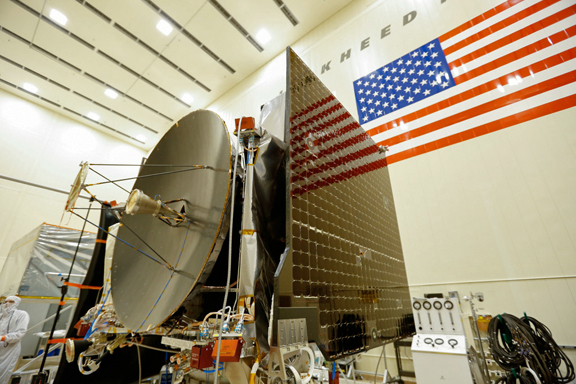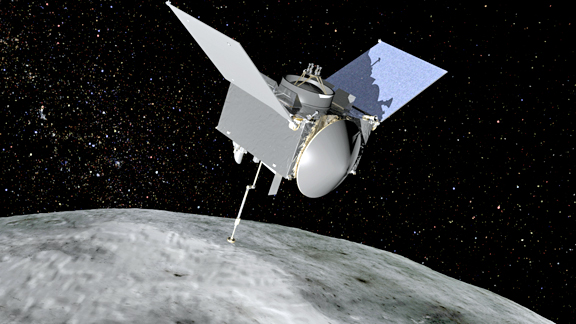
The spacecraft that will perform NASA’s Origins Spectral Interpretation Resource Identification Security – Regolith Explorer mission, known as OSIRIS-REx, arrived at Kennedy Space Center from Buckley Air Force Base near Denver on May 20 aboard an Air Force C-17 at the Shuttle Landing Facility.

Photo of OSIRIS-REx is courtesy of Lockheed Martin.
OSIRIS-REx will come out of the shipping container on May 21, go onto a rotation fixture on May 23, have a spin test from May 24-25 and will then be hoisted onto a dolly on May 26 for other upcoming activities. A partial solar array deployment test is scheduled on May 31.
OSIRIS-Rex is scheduled to launch on September 8 at 7:05 p.m. EDT. As currently planned, the spacecraft will reach its near-Earth asteroid target, called Bennu (formerly 1999 RQ36), in 2018. When within three miles of the asteroid, the spacecraft will begin six months of comprehensive surface mapping. The science team then will pick a location where the spacecraft’s arm will take a sample. The spacecraft gradually will move closer to the sit, and the arm will extend to collect a 2.1-ounce sample for return to Earth in 2023. The mission will help scientists investigate how planets formed and how life began, as well as improve our understanding of asteroids that could impact Earth.
Bennu is about 1,900 feet in diameter or roughly the size of six football fields and could represent a snapshot of our solar system’s in its infancy.

Artistic rendition of OSIRIS-REx is courtesy of NASA.
NASA’s Goddard Space Flight Center provides overall mission management, systems engineering, and safety and mission assurance for OSIRIS-REx. Dante Lauretta is the principal investigator at the University of Arizona’s Lunar and Planetary Laboratory. Lockheed Martin Space Systems in Denver built the spacecraft. OSIRIS-REx is the third mission in NASA’s New Frontiers Program. NASA’s Marshall Space Flight Center in Huntsville, Alabama, manages New Frontiers for the agency’s Science Mission Directorate in Washington, D.C.
Story by Steven Siceloff, NASA

